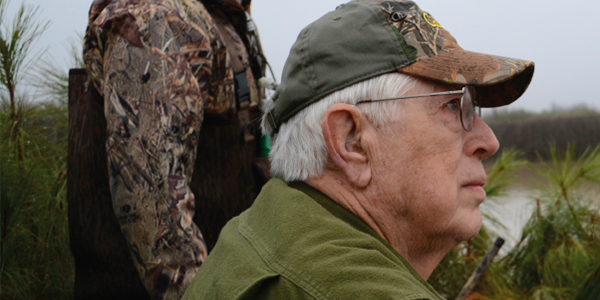James Justiss Jr

Morning shooting hours were well underway on the Louisiana marsh, but a dense fog had dampened our gun barrels and was keeping daylight - and the early duck flight - at bay.
Suddenly, a pair of shadowy forms cut through the mist, winging safely past the blind without any challenge from three gunners peering over the rim of a pine-bough-covering blind.
"There go your canvasbacks," said James Justiss Jr., our hunt host on Whitehall Plantation, his 4,000-acre ranch which adjoins the northwest corner of Catahoula Lake, a large freshwater impoundment famous for wintering tens of thousands of canvasbacks.
Justiss, the chairman of Justiss Oil Co. in nearby Jena, Louisiana, has been hunting on and near Catahoula Lake since 1946. He recalls years with 600,000 wintering ducks on the 30,000-acre lake. Over the years, Justiss has experienced spectacular hunting, such as "pintails everywhere," to slow days and even poor seasons.
Today, he's concerned about a steady decline in the lake's health, which he says is the result of a canal that has stopped the flow of water. In the past, strong currents would cleanse the lake and keep it vibrant.
"Now, instead of being purged, the sediment settles and kills the vegetation (duck food), and woody vegetation is moving into the lake," Justiss explained. "It's non-productive for ducks. The lake is dying, and the hunting is somewhat in decline. It's nothing like it was 50 to 60 years ago. You can see it dying."
Justiss, a career oilman who studied geology in college, has a strong vested stake in the health of Catahoula. He rarely hunts on the lake anymore, but through family connections, he still has access to duck blinds out there. Importantly, he understands that Catahoula is the drawing card that feeds ducks onto his property.
He has witnessed a dramatic shift in the lake's population of wintering ducks.
"When I was a young man, you had to be a magician to harvest one canvasback. They were extremely rare," he said. "We saw mostly mallards and pintails and every other duck in the flyway. About 25 years ago, the canvasbacks started showing up when the water got deeper. At their peak, we had the largest concentration of canvasbacks anywhere in the country."
From a hunting standpoint, the sprawling Catahoula is a visual wonder. Except for a closed refuge area in the center, massive blinds large enough to hold a half-dozen or more gunners dot the waterscape. And each blind is surrounded by an enormous spread of decoys - one blind we hunted had 900 floaters ringing it, including dozens of bleach bottles painted black to add to the illusion.
The secret to those large spreads, Justiss said, is that the whole rig is transported out there in the heat of summer, when the lake bed is nearly bone dry. Hunters drive trucks and ATVs out to carry all of their decoys and materials for blinds. The decoys and blinds are all in place well before the water is back on the lake in time for the ducks to arrive.
"There's nowhere else like Catahoula," Justiss said. "It's a unique place for ducks."
A consummate conservationist, Justiss manages Whitehall for a variety of game, but ducks are his passion. A tour of his acreage reveals a mind-boggling number of wood duck nest structures, and various flooded marshy areas have been designed to hold wintering ducks.
During a short January stay at the plantation, hunters took wood ducks, green-winged teal, gadwalls, mallards, shovelers, ring-necked ducks, and even bluebills. Canvasbacks proved to be elusive for the group, no doubt in large part to the thick fog that blanketed the lake for most of two days.
Whitehall does not host commercial hunts but instead serves as a wonderful place replete with warm southern hospitality that is reserved for family, friends, and business associates to enjoy.
Justiss has been a long-time supporter of Delta Waterfowl. In particular, he appreciates Delta's efforts to produce ducks on the U.S. and Canadian prairies, as he understands the value that work brings south to Louisiana each fall.
"Delta is doing a great job," Justiss said. "I particularly like your Predator Management and Hen House programs. I am proud to support you in your efforts." - Paul Wait



